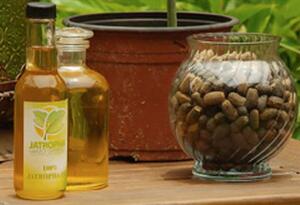MHF is produced by physically blending and microemulsifying various ratios of plant oil with diesel fuel in the presence of an additive, which could be composed of cetane enhancers, viscosity reducers and/or emulsifiers. A blend of 30% plant oil and 70% diesel fuel is called MHF30 while a blend of 50% plant oil and 50% … Read More
Jatropha Oil
Production and Use of Jatropha Oil
The process of biodiesel production involves two phases. The first phase is the extraction of crude oil from seeds and the second is the transesterification of the crude oil into biodiesel. The biodiesel extraction process involves the use of machines to extract the oil from the seed. This produces crude jatropha oil, and hull and … Read More
Characteristics of Jatropha Curcas
Jatropha is a genus of about 175 succulent plants, shrubs and trees from the family Euphorbiaceae, subfamily Crotonoideae, and tribe Jatropheae. There are at least four important species, namely, J. curcas, J. gossrifolia, J. podarica, and J. multifada. It was botanist Carl Von Linne who first classified the plants in 1753 and gave the botanical … Read More
Biodiesel Sources
Biodiesel is produced using a variety of sustainable feedstocks such as vegetable oils extracted from plants, used cooking oils, animal fat, and even algae. It contains no petroleum. Major vegetable oils used to make biodiesel today are: Soy oil Palm oil Peanut oil Rapeseed oil, and Used vegetable oil from restaurants Another oil gaining popularity … Read More
Jatropha Oil for Biodiesel
Jatropha Oil is produced from the seeds of Jatropha Curcas, a plant that is very toxic to humans and other living things. Therefore, the oil extracted from jatropha seeds is used primarily for biodiesel when it is not refined. Some Jatropha oil is professionally extracted from Jatropha seeds, and it is carefully processed to prepare … Read More
